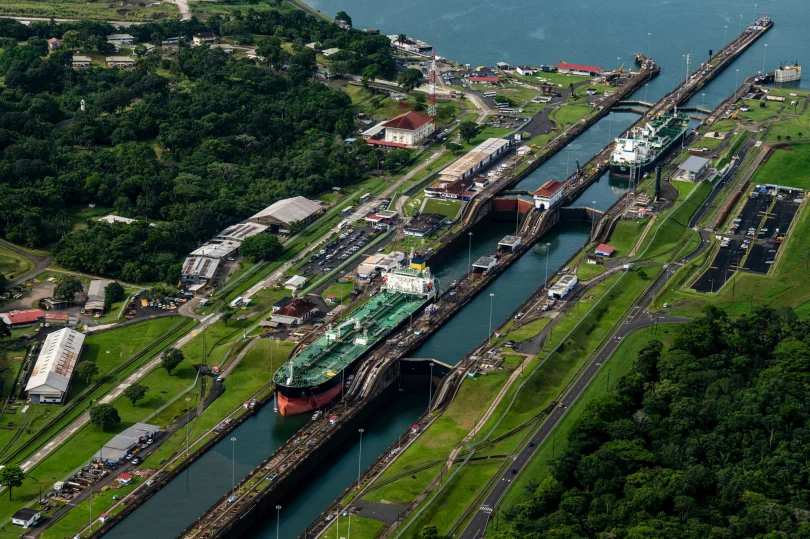In a turn of events, China has become a major talking point in United States presidential campaigns. This dynamic, first set in motion by Donald Trump during his initial presidential run, has continued to shape political debates throughout his second term.
Trump has imposed additional tariffs on China, raising trade levies to 145 percent. In response, China retaliated with its own tariffs of 125 percent.
But the tension between the world’s two largest economies goes far beyond trade. While trade remains central, the latest flashpoint involves trade-facilitating infrastructure, the Panama Canal.
The Canal is fast becoming another battleground in the U.S.-China rivalry. Amid this geopolitical contest, Nigeria’s Adebayo Ogunlesi, through his company Global Infrastructure Partners (GIP), is acquiring a 90 percent stake in the Panama Ports Company, which is currently owned by the Chinese company CK Hutchison.
The Panama Ports Company currently operates and controls the Balboa and Cristobal ports, both located along the Canal.
Although the details of the deal are still being finalised, and the deadline has been extended due to complex geopolitical interests, Ogunlesi may emerge as the Nigerian businessman capable of easing tensions between Washington and Beijing.
Between 1903 and 1914, the United States embarked on a bold engineering mission to connect the Pacific and Atlantic Oceans through an artificial waterway known as the Panama Canal. For decades, operations at the Canal were the exclusive preserve of the U.S. government, and the surrounding zone was guarded by three military bases within what was described as the Canal Zone.
In 1977, the transition to Panamanian control began, following a treaty signed by then U.S. President Jimmy Carter. By 1999, the process was complete, with the Panama Canal Authority assuming full control of the canal. As part of this transition, the adjoining ports of Balboa and Cristobal, located at the entrance and exit of the canal, were concessioned to private operators.
Hutchison Ports, a subsidiary of CK Hutchison, won the 25-year bid in 1997 to manage both ports. The Hong Kong-based company has maintained control since then. However, what was once a quiet arrangement has now become a thorn on Trump’s side. From the beginning of his second presidency, he reiterated his desire to reclaim American influence over the canal.
During his 2024 campaign, he declared, “If the principles, both moral and legal, of this magnanimous gesture of giving are not followed, then we will demand that the Panama Canal be returned to the United States of America.”
Just 13 days before his inauguration, Trump reinforced his position, saying, “The Panama Canal is vital, and it is being operated by China. We gave the Panama Canal to Panama, not to China.”
As of 2021, reports indicated that about six percent of global trade volume passes through the Panama Canal. Of that figure, 66 percent of cargo ends up in U.S. ports, while 13 percent is bound for Chinese ports. These numbers highlight the critical role that the 50-mile waterway plays in global trade.
For both the United States and China, the canal represents a strategic artery of commerce and influence. Control over the strip is seen as vital to national security. After Trump’s renewed criticisms of Chinese involvement, Panamanian officials were quick to dismiss his claims.
The administrator of the Panama Canal Authority, Ricaurte Vásquez Morales, told CNBC, “We do not cut corners in anything that deals with security.”
Yet, similar concerns continue to resonate among some American stakeholders. Carl Bentzel, who leads the Union of Waterfront Employers in America, alleged that CK Hutchison remains the only company winning bids from the Panama Canal Authority. Other U.S. interests have also raised questions about alleged favouritism toward Chinese shipping firms.
Adebayo Ogunlesi’s entry into this equation comes at a pivotal moment. Following BlackRock’s acquisition of Global Infrastructure Partners earlier in 2024, the Nigerian-born financier joined BlackRock’s board, giving him significant leverage in shaping strategic infrastructure investments.
The acquisition of CK Hutchison’s port assets, valued at $22.8 billion and covering 43 global terminals, is GIP’s first major deal under the BlackRock banner. The Panama assets, though just a small fraction of the total portfolio, are by far the most politically sensitive.
Analysts see Ogunlesi’s involvement as more than a commercial transaction. It may serve to temper geopolitical tensions by introducing a neutral, Western-aligned intermediary into a zone of contention. Yet, the deal faces resistance from Beijing. The Chinese government has reportedly warned that it will block the transaction unless its state-owned shipping company, COSCO, is granted an equity stake.
Bloomberg reports that COSCO is seeking veto rights and equivalency in the arrangement before Chinese regulators approve the deal. This tug-of-war reflects how global finance is being pulled into the orbit of strategic power politics, with even private equity deals now caught between competing national interests.
Should BlackRock and GIP successfully close the acquisition, it would represent not only a commercial victory but also a diplomatic balancing act. It would ease U.S. concerns about China’s dominance while giving Beijing continued access through regulated partnerships.
In effect, the new consortium led by BlackRock could become a buffer, managing one of the world’s most sensitive pieces of trade infrastructure in a way that appeases both superpowers. For Ogunlesi, it marks a rare intersection of finance, diplomacy, and national strategy. It positions a Nigerian at the centre of a global power struggle where money, influence, and geopolitics converge.

